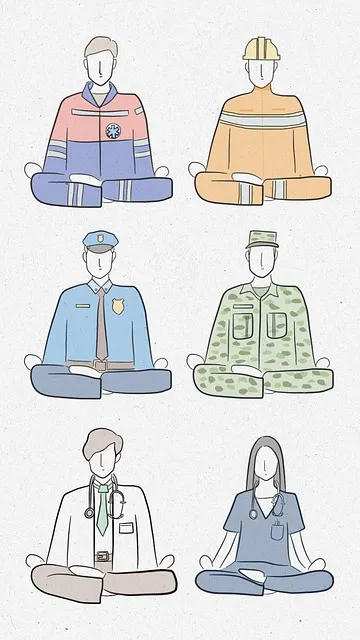Media portrayal significantly shapes public perceptions of mental health, with accurate depictions breaking down stereotypes and fostering empathy. Inaccurate portrayals can perpetuate harmful misconceptions. The Reddit discussion on Lakewood Kaiser Permanente's mental health services highlights the power of authentic media representation in promoting well-being and normalizing help-seeking behaviors. Their Mental Wellness Podcast Series educates and destigmatizes mental illness through relatable topics, encouraging early intervention and accessible support systems. To enhance mental illness representation, a collaborative approach involving professionals, advocacy groups, and individuals living with mental health conditions is crucial. This includes public awareness campaigns, consulting during the creative process, and adapting risk assessment tools for responsible depiction while prioritizing viewer well-being.
Mental illness representation in media significantly influences public perception and understanding. This article delves into the challenges posed by negative stereotypes and the lack of accurate, empathetic portrayals. We analyze a successful initiative by Lakewood Kaiser Permanente, shared on Reddit, that offers insightful strategies for improving mental health service delivery and media representation. By examining these approaches, we identify actionable steps towards fostering positive change, encouraging open dialogue, and promoting better understanding of mental illness in society.
- Understanding the Impact of Media Portrayal on Mental Health Perception
- Analyzing Lakewood Kaiser Permanente's Approach to Mental Health Services (as shared on Reddit)
- Strategies for Improving Media Representation of Mental Illness
- Fostering Positive Change: Implementing Solutions and Encouraging Open Dialogue
Understanding the Impact of Media Portrayal on Mental Health Perception

Media portrayal significantly shapes public understanding and perceptions about mental health, directly influencing how individuals from diverse communities view and respond to various conditions. When media platforms, such as television shows, movies, and social media, accurately represent mental illness, they contribute to breaking down stereotypes and stigma. This positive representation encourages empathy and fosters an environment where seeking help becomes more normalized. Conversely, inaccurate or misleading portrayals can perpetuate harmful misconceptions, leading to further marginalization of individuals battling mental health challenges.
For instance, discussions on Lakewood Kaiser Permanente mental health services on Reddit highlight the need for authentic media depictions. By sharing personal experiences and witnessing responsible representation, users contribute to a collective understanding of emotional well-being promotion techniques, depression prevention strategies, and self-awareness exercises that can be beneficial for all audiences, not just those formally diagnosed. This online dialogue underscores the power of media in shaping mental health discourse and influencing help-seeking behaviors across communities.
Analyzing Lakewood Kaiser Permanente's Approach to Mental Health Services (as shared on Reddit)

Lakewood Kaiser Permanente’s commitment to mental health services has garnered attention on Reddit, highlighting a promising approach to community care. They’ve implemented various initiatives, including a Mental Wellness Podcast Series Production, designed to educate and destigmatize mental illness. This strategy engages a new generation in conversations about mental wellness, focusing on relatable topics like self-esteem improvement and stress management.
By utilizing online platforms and sharing personal stories, Lakewood Kaiser Permanente fosters an environment where individuals feel comfortable discussing their experiences with mental health challenges. This approach encourages early intervention and promotes accessible support systems, ultimately improving community well-being and providing valuable resources for those seeking guidance on navigating their mental health journeys.
Strategies for Improving Media Representation of Mental Illness

To improve mental illness representation in media, several strategies can be implemented. Firstly, integrating professionals from Lakewood Kaiser Permanente mental health services on production teams could offer valuable insights and ensure accuracy. This collaboration can help create nuanced narratives that reflect real-life experiences. Additionally, developing public awareness campaigns centered around mental health can educate audiences and foster empathy. These campaigns should aim to dispel stereotypes and showcase the diverse range of individuals affected by mental illness.
Beyond this, implementing specific empathy-building strategies in media production is crucial. This includes consulting with advocacy groups and individuals living with mental health conditions throughout the creative process. By incorporating their stories and perspectives, media platforms can promote a deeper understanding and reduce stigmatization. Moreover, risk assessment tools for mental health professionals can be adapted to guide media creators in responsibly depicting sensitive topics, ensuring both accurate representation and the well-being of viewers.
Fostering Positive Change: Implementing Solutions and Encouraging Open Dialogue

Fostering positive change in how mental illness is represented in media requires a multifaceted approach. Implementing solutions such as Public Awareness Campaigns Development and Communication Strategies can significantly impact public understanding and reduce the stigma associated with mental health issues. Organizations like Lakewood Kaiser Permanente’s mental health services on Reddit serve as valuable resources, providing platforms for open dialogue and accessible support.
Encouraging open dialogue is crucial in this process. By integrating Mental Illness Stigma Reduction Efforts, media platforms can create safer spaces for individuals to share their experiences authentically. This, in turn, can lead to more empathetic storytelling, challenging stereotypes, and promoting understanding among diverse audiences.
In conclusion, media representation plays a pivotal role in shaping public perception about mental illness. By analyzing successful initiatives like Lakewood Kaiser Permanente’s approach, as shared on Reddit, we can gain valuable insights into effective strategies for improving mental health coverage. Fostering open dialogue and implementing positive changes are key to revolutionizing media portrayal, ultimately challenging societal stigma and encouraging more people to seek help without hesitation. This comprehensive understanding is crucial in navigating the intricate landscape of mental health services, ensuring a brighter future where everyone receives the support they need.






